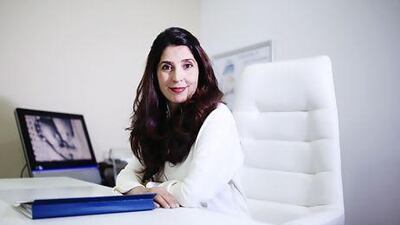Growing up in 1960s Dubai, Amal Al Shunnar lived next door to her parents’ polyclinic where her father worked as a GP and her mother as an obstetrician. And ever since she was a child, she had watched women arrive at the clinic to give birth. It is perhaps little surprise that she herself is now a fertility specialist.
“My mum was very passionate about her work,” Dr Al Shunnar says. “She instilled a lot of passion in us. I am sure that’s what led me into this field.”
After completing her secondary education in the UAE, the Emirati went to university in Ireland, graduating from medical school at The Royal College of Surgeons before completing her training at Hammersmith Hospital in London and Rotunda Hospital in Dublin.
With her sister a plastic surgeon in the UAE and one of her two brothers involved in setting up Dubai Healthcare City (the other is a businessman), medicine, clearly, is a family affair. Then about 10 years ago, she started working with Dr Michael Fakih – considered a pioneer in the field of fertility – in a career move she describes as “very inspiring”. The duo went on to found Fakih IVF clinic and later married.
“We worked so well together,” she says of collaborating with her husband. “He really had these genius ideas and thought outside the box.”
Now the medic has been recognised for her work in the fertility field, receiving the Most Innovative Entrepreneur award at the recent fifth Annual Women in Leadership Forum in Dubai.
At Fakih IVF, she has helped to bring new fertility procedures and treatments – including microarray, a sperm retrieval practice – to the UAE. The clinic was also the first centre in the Middle East to have a fully-functional, in-house genetic lab, according to Dr Al Shunnar, and it also specialises in helping many international patients whose previous IVF attempts have failed.
At 60 to 70 per cent for women under the age of 40, the clinic’s success rates are considered very good.
“It’s about getting as much new technology into our work,” says Dr Al Shunnar. “We really did everything to try to get everything that made a difference to our success rate.”
IVF treatment is Dr Al Shunnar’s business but she appreciates that for the couples who come to her it’s a financial and emotional roller coaster.
“I tell them if I can help them or if I can’t,” she says. “You have to counsel women to let them know where they stand: this is how much I can help you; this is a great technology; this might help the success rate.
“A lot of what is driving me is the actual getting a woman pregnant. When you have a passion for this and you really want to make a difference for each person it does drive the business. Every embryo transfer that I do, I measure; it’s not like quick, quick. It makes a difference so I’ve got to get it right.
“Every egg collection I make sure I get it as right as possible. Every history I take I make sure I am not missing a single thing because every one of those steps makes a difference in the final outcome.
“You have to check your overheads but some things you don’t compromise on at the end of the day.”
Since having her own children – twin girls, aged four, and a two-year-old boy – it’s her social life that’s had to give, to the extent that one twin recently asked her if she had any friends.
“I thought: this is not good so I called up my best friend and said, ‘You know what, come on over,” she laughs.
Her children, though, are interested in her work and ask their mother after she completes a procedure whether the patient is pregnant. They were also delighted when she won her recent prize.
Incredibly, at 75, Dr Al Shunnar’s mother is still working, now delivering the children of the daughters of the babies she helped bring into the world 50 years ago.
So will Dr Al Shunnar continue to work into her retirement too?
“Sometimes I think I won’t do that,” she reflects. “But the other day I heard myself saying something and I sounded just like my mum.
“So I think I am going to be like that one day because if someone comes to you and you feel you can really make a difference in their life, you do it. It’s the most gratifying experience.”

